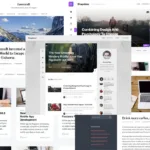Affiliate Marketing for Beginners Part 2 will cover affiliate marketing fundamentals and some, often asked by new bloggers, questions and thoughts
Congratulations, you’ve decided to become an affiliate marketer!
Now what? 🙂
Now is the time for you to zoom in a bit and choose your next step.
Don’t worry, I’ll help you with that.
By the time you read this entire article, you’ll know exactly what kind of affiliate marketing you will do, on which platform, and what exactly will you promote.
Here’s what you’ll find out today:
Table of Contents
Let’s get started!
This article is Part 2 guide from my Affiliate Marketing For Beginners series, linked below:
- Affiliate Marketing For Beginners – The Dark Side – Part 1
- Affiliate Marketing For Beginners – First Decisions to Make – Part 2 (this article)
- Affiliate Marketing For Beginners – Starting Your Blog – Part 3 (coming soon)
What’s the main reason for you to start a blog?
Before I go deeper into the specifics of affiliate marketing, let’s talk briefly about the real reason behind your decision to become a blogger.
Why do you want to start a blog and do affiliate marketing?
Of course, it’s the money, I know. But that shouldn’t be the only reason or the main reason, not in the way you think at least.
Besides money, you need to have at least some pleasure or interest in the topic you are writing about. I won’t say passion, although it would certainly help.
Even if you are writing about new things, about things you’re about to learn, that main idea needs to excite you or you need to look forward to it, especially if it’s something beneficial for you (your blog) and your readers.
I cover this more in my How to Start a Blog guide, and the answer to this question is more important than it might seem.
You know when you decide to lose weight, you are usually motivated by pain (your back hurts, your knees, you feel weak) and you want to feel healthier. Or, you’d like to be more attractive to new potential partners, or you’d like to feel better about yourself when you take a look in the mirror.
Whatever the reason might be, it’s usually strong and very motivating.
You need to find the same reason for this, wether it is because you’ve had enough living from paycheck to paycheck, whether you hate your job and want to be your own boss, whether you’d like to travel the world, FIND IT, write it down and put it somewhere you’ll see it daily as your own motivational quote.
Good? Ok, now let’s get even more specific about that subject and discover your new goals.
What’s your main goal as a new Blogger?
If you want to make money with your blog you need to set yourself a specific goal, how much money exactly?
“I want to make $2k per month with my blog.” – Great, write it down somewhere.
Is it more or less than that? No problem, it’s your goal. You just need to visualize it and make it real by putting it on paper.
If you want to quit your job, what do you need to do/make/achieve to be able to do that? – Write it down.
Is your goal reaching a huge audience? Ok, how big is that? 10 people, 1000 people, millions of people? Specify it and write it down.
Is your goal to become financially free and location-independent? Do you know what exactly it takes to achieve that? Go and find out and write it down.
Whatever your goal is, when you specify it and write it down you now have something to look forward to and push all your efforts towards it. You know where you are going and everything you do daily should move the needle at least a bit in that direction.
So far you answered WHY you want to be a blogger and WHERE you want to go, now let’s see HOW will you get there.
What kind of affiliate marketing you should do?
I’d say you have two options.
You have more, but I’ll give you only two to choose from today.
Those are:
A) Amazon affiliate marketing
B) Blogging / SEO affiliate marketing
With the Amazon affiliate program, you’ll be promoting real-life physical products.
With SEO / Blogging affiliate marketing, you’ll be promoting both digital products AND digital services.
What’s easier for a beginner?
From my experience – the SEO/Blogging niche.
Why?
- Better (higher) commissions
- A possibility for recurring income
- Easier to test and review products and services (because they are digital, it’s faster to get access to them)
- You’re not depending on only one vendor (Amazon can ban your account anytime or change the commission percentage).
There’s one more reason why the blogging niche is the best one for beginners.
It’s because while you do it you’ll also learn so much that later on if you want to start another blog for Amazon affiliate marketing, or maybe some other website to monetize it with display ad networks such as Adsense, Mediavine, Adthrive, or Ezoic.
It will be so easy for you and you’ll be able to make it profitable even faster.
I know what you’re thinking now if you’re a complete beginner, how the hell are you going to write about something you haven’t got a darn clue about?
That brings us to the next chapter…
How to write about things you are not familiar with
If you were an Amazon affiliate instead and you decided to make reviews about archery equipment and all you knew about it was what you saw in Robin Hood movies, how would you do it?
You would do some searching on Google, as you do every day to try to find a new recipe, check Bitcoin value, or to see when’s the new season of your favorite show coming to Netflix.
You use Google every day to learn new things and find information, it’s the same thing when you are a blogger.
Now it’s even easier, there’s also ChatGPT.
Yes, some things you can know from before but to learn new things you need to absorb new information.
Do that by either going through articles found on Google, videos on YouTube, listening to a podcast, reading books in your library, from an online course, from schools (hardly but ok), by getting a mentor or coach, or in any other way you prefer to get new information.
Google and YouTube are the easiest, fastest, and cheapest methods to do it.
By doing research and learning new things you’ll have something to talk about and write about.
But you won’t just repeat what other people say, no sir, you’re going to give it a twist of your own, with your point of view and your advice.
You’ll notice something that no one else has and share that with your audience.
Maybe you’ll see a bunch of info across dozens of articles on the subject, but none of them has all the important points in the same article, and that’s where you come in.
You have to understand, that everyone has the same access to information, everyone uses the same or similar tools and many (but not all) of us come to the same conclusions – it’s all in the way how you present it to your readers.
“It’s not just what you write, it’s how you write it.”
Let your piece be easier to digest, better formatted, funnier, with catchier headlines… Use whatever you can to your advantage to make a better experience for your readers.
With this particular niche, going for Blogging / SEO, the good thing is, that you will do the things you write about and try the tools and services you write about.
Yes, maybe you can write about some things without trying them, but in that scenario, you can’t dive in deep and find some golden nuggets of advice for your readers.
Remember this, writing good articles is proportional to how much time you invest in research and in writing the article.
If you want to make a good, big piece of text that will have tremendous value for your readers, be prepared to put a lot of working hours into it.
Which medium for affiliate marketing should you choose
If you ask me you only have 2 choices.
Blogging (writing text) and/or YouTube (making videos)
Prepare to either love to write articles or to speak in front of the camera/microphone – or have the money to pay someone else to do it.
Affiliate marketing can be done in any way as long you send someone to your affiliate link.
You can send it via email, text messengers, PDF files, social media…heck you can even print it on a flyer and put it on people’s car windshields.
One big difference when you compare all those to blogging or YouTube is that those other methods are easily ditched or forgotten, while websites and videos on YouTube stay there until you remove them (you have that power, not the users).
Not only that, they can be easily found by countless users – without limitations, 24/7/365 – all the time!
As I wrote in my previous article, if you’re just starting, go with a blog as your main medium.
Perfect that, monetize it, start getting traffic and revenue from it, and only then think about growing on other channels.
To start a blog you’ll need a blog (duh), which means you’ll need a domain name, hosting and WordPress CMS installed on it.
WordPress is the content management system that you will use to make your website and publish your articles.
Let’s see why you should use WordPress and not something else for your blog.
Is WordPress the best for affiliate blogging
Probably.
I won’t say for sure because I haven’t tried everything else out there, but WordPress is behind 43% of all websites in the world, that tells you enough.
There are other platforms out there but WordPress is the most popular and perfect for this kind of work.
And it’s really easy to use, once you learn the basics.
The best thing is – there’s a plugin for almost any kind of customization you need.
There are a ton of free themes (ready-made layout designs for your blog) too, and now there are awesome drag’n’drop page builders available as well, enabling you to achieve any kind of look or functionality easily.
Trust me, WordPress will become your favorite tool and you’ll use it every day with pleasure.
There are other websites out there, such as Medium, but you never have full control there and it’s more difficult to stand out among the crowd.
While WordPress itself is free, to be able to use you need hosting and a domain name. It’s a small investment you need to make in the beginning which can will give you so much more in return if you just stick to it.
Think of WordPress not just as a publishing tool, but as a marketing tool too. With it and with plugins added to it, you’ll optimize your articles and website for SEO, you’ll grow your email list, you’ll track your links, and much more.
Moving forward, let’s see what will you promote as an affiliate and why in the next chapter.
Products vs Services – What should you promote
I’ll start with a bang:
Monthly recurring revenue (MRR) – concentrate on this for at least 80% of everything you do.
Products are mostly one-time purchases, or they renew yearly, the commissions are nice and big, but still, they are one-time commissions and you need to find new customers over and over again.
Use ‘one-time purchase’ products for bigger commissions at the beginning. Look at it as short-term success and as quick money that you’ll reinvest back into the business.
Services or SAAS solutions (Software As A Service) are your best bet.
You’ll start with small commissions, maybe $5/mo, $10/mo, maybe $30/mo. In time, it will add up!
And bad times will eventually come, global pandemics, wars, you never know what will happen and when, and recurring income will give you security and peace of mind in months when business is not doing well.
To end this on a positive note, when you take a long vacation, money will still keep coming while you drink those fancy cocktails on the beach, all because of the recurring commissions you have 🙂
If you didn’t get my point, you should use both.
Promote both products and services at the same time. Often they go hand in hand (for example, an opt-in form plugin which is a product, needs an email sending provider which is a service).
Later on the road, you’ll probably promote your own products or services, that’s a natural evolution of every successful blogger out there.
Who are you writing it for?
This is not the thing I was aiming at for this part of the article but I want to get it out in the open since the opportunity has presented itself, you are writing for people, not search engines.
You may read on other blogs or see on YouTube that you need to put a lot of effort into SEO, true, but when it comes to writing, always write articles with the end user in mind (real people), not Google (or other search engines).
*That doesn’t mean you shouldn’t optimize your article for certain keywords, I’ll get to that in another piece on my blog soon
And who are those end users exactly?
Think of it like this, what do you use Google for?
I’ll give you a few examples of how I use Google as a ‘regular’ user:
- When I want to buy something, I try to find the best price
- When I’m not sure what to buy I do research, read reviews, and compare products
- When I need information about some company or their store, whether it’s working hours, products on sale, contact info…
- When I’m looking for new recipe ideas or meal ideas for a specific diet
- When I travel somewhere, apartments or hotels to book, interesting things to do or see in that city
- When I need ideas for B-day or Christmas gifts
- When I have a problem on my website or need to do something that I don’t know how and try to find a solution for it
- When I or anyone else I know is sick, has some symptoms I try to find what is the best cure (bad idea, always check with the doctor)
- When I’m trying to learn something about how to do something, for example, how to make money online or start a blog
From just these ideas you can see that I – and probably a lot of other people out there – either search for things to buy (intent to purchase), try to find specific information about a company or a product (search for information even if it’s not going to end with a purchase), and finally, searching for a solution to my question or a problem (quick problem solving and/or learning new things).
And when you start writing you have to put yourself in the shoes of people who’ll use Google to find your article. What are they searching for, what are they trying to get from it, do they want to learn something or buy something, do they need it now (urgency) or are they just browsing the net casually, are they trying to find that info for their business purposes (to make or save money), or they are just doing it for themselves?
All those questions will give you many ideas for the answers you’ll put in your article.
And when you know who’s your audience and what they want/need, it’s much easier to write, and more importantly, to profit from them.
Luckily for you, in this niche, most people are looking for something to improve their business and make money, which means they are ready to invest some money, which means you can sell them something.
Deciding on the type and tone of your new blog
This is a big one, and it can have a huge effect on the success of your newly created blog.
Here’s what I mean by the type and tone of your blog.
By type I mean is it going to be a blog with your face on it so the people can learn about you, connect your face with your text, and get to know you through your text and personal bits you’ll share the bits of here and there.
Alternatively, you can have a “no-face” blog which would be “just” a brand-name blog with a strict focus on the content where the actual author isn’t that important (stealing attention).
While the latter might be better if you plan to sell the blog in the future, I’d certainly go with the personal style type blog because that’s right away a ticket to have something unique your readers will be able to connect to, especially if you want to transition to YouTube sometime in the future.
This blog, Affiliate Firestarter, is a combination of both with a strong emphasis on having a unique brand and funny as hell author (no joke).
You can see examples of strictly brand (no user mentioned anywhere) on most Amazon affiliate blogs.
Whether your new affiliate blog is personal, funny, comprehensive, or purely technical don’t worry about it, you’ll find an audience that appreciates your specific approach.
What next?
It’s time to start working on your new business venture, your affiliate business.
We covered all the basics and theories in these first two articles, in the third and final article of this series, I’ll show you which step to take next, what to focus on, and what you should avoid doing (for the time being) and finally, how and when to launch your blog.
The final steps before launching your affiliate blog, all that planning and preparation, can also be tricky and put you in a neverending loop of making everything perfect, you’ll want to avoid that and I’ll show you how.
It’s exciting and I’m glad you decided to become a blogger and join the family.






